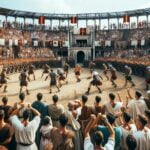Imagine the ancient Olympics, a grand spectacle of athleticism and cultural expression. More than athletic prowess, the ancient Olympics were a symphony of celebration, where music played a vital, ever-present role. From hymns honoring Zeus to victory marches celebrating triumph, music filled the air of Olympia, shaping its cultural and spiritual significance. Join us on a journey into the enchanting world of ancient Olympic music, where we’ll uncover the instruments, rhythms, and melodies that resonated through history.
The Music of the Ancient Olympics: A Tapestry of Sound
Picture a stadium filled to the brim, the Greek sun shining brightly. You are not only hearing the roar of the crowd, but also music that seems to vibrate in your very bones. That was the reality of the ancient Olympics, where music was not just an ornament, but an essential part of the experience.
Instead of Spotify or loudspeakers, the ancient Greeks had their own “hits” and “star instruments.” The aulos, a double-reed wind instrument similar to the modern oboe, was the king of the stadium. Imagine its sound encouraging athletes during races or setting the pace for wrestlers. And when victory was palpable in the air, the salpinx, an imposing long, straight trumpet, announced the champion with notes that echoed throughout the arena.
But music was not just for encouragement. Instruments like the lyre and the kithara, relatives of the guitar, filled the air with melodies that accompanied poets and celebrations. It was a multi-sensory experience: sight, sound and emotions merged into a single experience.
Deciphering the Lost Symphonies
Lost to time, alive in spirit: while concrete musical notations are scarce, archaeological evidence and literary accounts offer glimpses into the vibrant soundscape of the ancient Games. Historians, like detectives of the past, have found clues: descriptions in ancient texts that speak of the instruments and the type of music that was played, and representations in ceramics and sculptures that give us a visual idea of what those instruments were like and how they were used.
Although there is much we still don’t know, the music of the ancient Olympics continues to fascinate us. It is a reminder that the passion for sport, music and celebration connects us through time.
The Significance of Music in Ancient Greek Culture
To truly grasp the importance of music in the ancient Olympics, we must understand its significance in wider Greek society. Music was considered a fundamental element, deeply intertwined with religion, education, entertainment, and social life. The ancient Greeks believed music possessed the power to influence emotions, ethics, and even the cosmos itself. This belief, known as “ethos,” underscored the importance of music in all aspects of life, including the Olympic Games.
Instruments of the Gods: The Sounds of Olympia
While no musical notations from the ancient Olympics survive, evidence suggests a rich tapestry of sound:
- Wind Instruments:
- Aulos: This double-reed instrument, often compared to the modern oboe, played a central role in processions, sacrifices, and athletic competitions. Its presence may have served to regulate rhythm and enhance the intensity of events like running and wrestling.
- Salpinx: Primarily used for signaling, the salpinx, a long, straight trumpet, would have announced the start of events and heralded the victors with its powerful sound.
- Stringed Instruments:
- Lyre and Kithara: These instruments, ancestors of the modern guitar, likely accompanied poetic recitations and victory celebrations, adding a melodic dimension to these cultural expressions.
- Vocal Music:
- Hymns: Dedicated to Zeus and other gods, hymns performed by choruses during opening ceremonies and religious rituals would have invoked divine favor and created an atmosphere of reverence.
- Paeans: These songs of praise and victory, likely personalized for individual athletes, celebrated their achievements and added a triumphant soundtrack to the Games.
Challenges in Reconstructing Ancient Olympic Music
The lack of preserved musical scores from the period makes it challenging to recreate the exact sounds of the ancient Games. Our understanding relies heavily on:
- Literary Accounts: Writings from poets like Pindar, who composed victory odes for Olympic champions, offer valuable, if fragmented, descriptions of musical practices and instruments used during the Games.
- Archaeological Evidence: Depictions of musical instruments and performances on pottery, sculptures, and other artifacts provide visual clues, but interpreting these images requires careful analysis and leaves room for speculation.
The Enduring Allure of Ancient Olympic Music
The music of the ancient Olympics, though lost to time in its entirety, continues to captivate our imaginations. Through ongoing research and analysis of the fragments of evidence that remain, we gain a deeper appreciation for the role of music in shaping the cultural and spiritual significance of these ancient games. Just as athletes from across the Greek world came together to compete, so too did music unify and elevate the Olympic experience, creating a symphony of celebration that still resonates today.
Discover the fascinating life and legacy of Saint Cyprian and his profound impact on Christian history through this engaging St. Cyprian for kids.
















